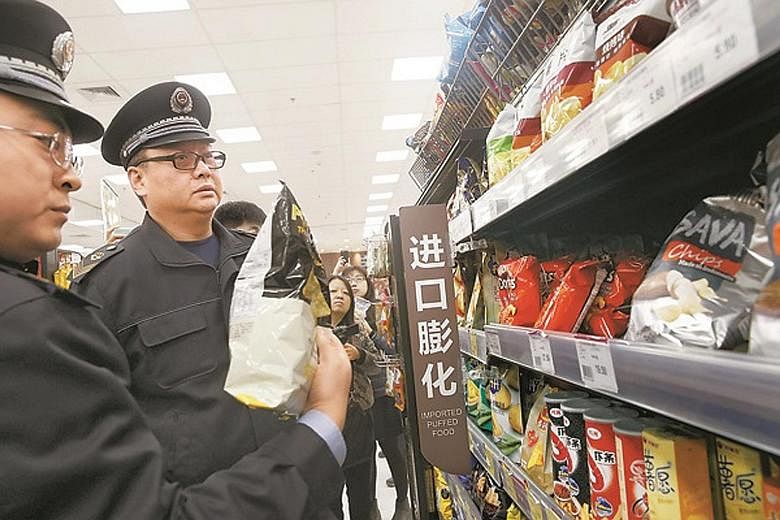SHANGHAI/BEIJING • Shanghai government inspectors said they found no evidence to support a Chinese television show's claim that Muji stores in the city stocked food imported from areas of Japan allegedly contaminated by radiation.
The city's Entry-Exit Inspection and Quarantine Bureau said it inspected food sold at Ryohin Keikaku's Muji chain in Shanghai and cleared the items, according to a report in the state-run English-language Shanghai Daily yesterday.
China Central Television's (CCTV) annual "name-and-shame" show that aims to uncover abuses by firms had fingered Muji for mislabelling items. CCTV said the labels hid the fact that the food items originated from Japanese areas that were contaminated after the 2011 nuclear meltdowns in Fukushima prefecture. China restricts food imports from those areas.
Muji issued a statement on Thursday saying the labels on its products featured in the report showed the location of its Japan headquarters, which is in the region affected by the China restrictions. Under Japanese law, the address of the company's headquarters must be stated on the packaging, Muji said. "This address is not the address of the production area."
Muji said it does not sell products that contain ingredients from Japanese areas subject to the ban. All food products sold in China are put under quarantine inspection before they are imported into China, it added. It also clarified that the Chinese-language label placed over the original Japanese label was in compliance with Chinese laws.
A spokesman said yesterday that the company will continue selling its Japanese imported goods that have passed inspections by China.
Muji has 183 stores in China as of November. It has stores in 27 locations in Shanghai, according to a count of shops on its website.
China has banned the importation of food and animal feed from Tokyo and 11 prefectures, including Fukushima, Niigata-ken and Tochigi, since April 2011 to guard against risks, according to the General Administration of Quality Supervision, Inspection and Quarantine.
Food from areas affected by the 2011 Fukushima nuclear disaster have been sold on many e-commerce platforms in China and in some shops. These include dairy products, cereal, rice and wine, the CCTV programme reported. CCTV did not immediately respond to an inquiry by Bloomberg News.
The show on Wednesday night also accused Nike of misleading consumers about "airbags" in its Hyperdunk shoes. Nike said in a statement it had sold 300 pairs of Hyperdunk shoes in China last year with "an inaccurate product description stating that the shoe contained airbags". Nike had apologised to consumers and offered compensation.
In Beijing, major supermarkets and e-commerce platforms have started to inspect imported food products following the CCTV report. So far, no product from any of the 12 areas has been found, said Mr Ji Ye, an official at the Beijing Food and Drug Administration. It is also conducting inspections of food enterprises in Beijing and will recall any product that is imported from the affected areas, he added.
The Chinese Foreign Ministry has urged the Japanese government to take more effective measures to handle the environmental fallout from the Fukushima nuclear disaster. Ministry spokesman Hua Chunying said at a press briefing: "We once again urge the Japanese government to be responsible, (in line) with the common interests of the international community, and fulfil their international obligations, release accurate and reliable information in a timely fashion and avoid doing anything that is detrimental to the marine environment and people's health."
The China Food and Drug Administration said the relevant authorities must strengthen supervision over food safety and severely punish culprits. Food safety has been a key concern among Chinese in the past decade, since melamine-tainted baby formula led to the deaths of six children in 2008. The authorities have since been taking measures to win back the public's confidence.
In Shanghai, more food safety labs will soon be established in markets across the city. It is among the first cities in China to have such labs that provide free and fast food safety evaluations that test for illegal additives and excessive pesticide residues.
BLOOMBERG, CHINA DAILY/ ASIA NEWS NETWORK, REUTERS


